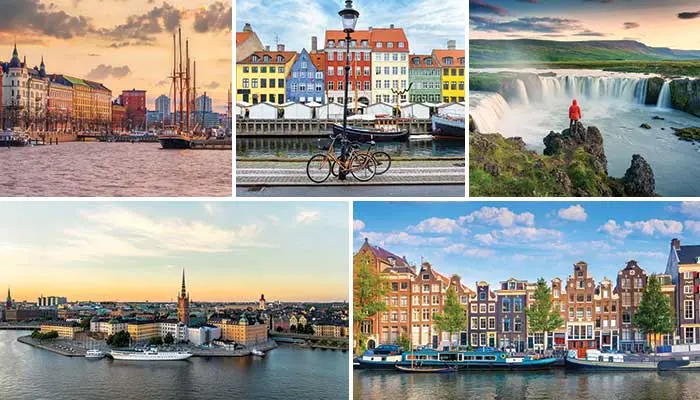Top 5 Happiest Countries in the World in 2025
Get inspired to visit the happiest countries in the world this year, as ranked by the World Happiness Report!
Happiness isn’t just a feeling; it’s a way of life in certain corners of the world. Every year, the World Happiness Report ranks countries based on factors like social support, freedom, health, income, generosity, and overall life satisfaction. In 2025, the top five happiest nations have once again set the gold standard for well-being. From stunning natural landscapes to progressive social policies, these countries prove that happiness is so much more than wealth; it’s about balance, security, and a deep-rooted sense of belonging. Let’s explore what makes them the world’s happiest places to live.
1. Finland
For the eighth consecutive year, Finland stands as the world's happiest country. This Nordic nation consistently excels in areas like social support, freedom, and trust in government. Finns enjoy a high quality of life, with a strong emphasis on work-life balance and a deep connection to nature. The country's commitment to education and healthcare ensures that citizens have access to essential services, fostering a sense of security and well-being. Finland's cultural practices, such as the widespread use of saunas and a profound appreciation for the outdoors, contribute to mental and physical health, reinforcing its top position in the happiness rankings.
.jpg)
2. Denmark
Denmark consistently ranks among the happiest nations, securing the second spot in 2025. The Danish welfare system provides robust social support, ensuring that citizens have access to healthcare, education, and unemployment benefits. This safety net fosters a high degree of trust in institutions and among individuals. Danes also prioritise work-life balance, often enjoying flexible working hours that allow ample time for leisure and family. The nation's commitment to environmental sustainability and cycling culture significantly improves the quality of life, making Denmark a beacon of happiness.
.jpg)
3. Iceland
Iceland's third-place ranking is a testament to its resilient and close-knit society. Despite its small population, Iceland boasts a strong sense of community and mutual support. The country's natural beauty, from geysers to glaciers, provides residents with a unique environment that promotes outdoor activities and a connection to nature. Iceland's emphasis on gender equality and progressive social policies also play a significant role in its high happiness levels. The nation's ability to unite and recover swiftly from economic downturns showcases the strength of its social fabric.
.jpg)
4. Sweden
Sweden's fourth-place position reflects its successful balance between economic prosperity and social well-being. The Swedish model emphasises equality, with comprehensive welfare benefits and free education contributing to a high standard of living. Swedes enjoy extensive parental leave policies and a strong focus on work-life balance, allowing individuals to pursue personal interests alongside professional commitments. The country's dedication to environmental conservation and green energy initiatives not only preserves its stunning landscapes but also instils a sense of pride and purpose among its citizens.
.jpg)
5. Netherlands
The Netherlands rounds out the top five happiest countries, thanks to its culture of tolerance and inclusion. Dutch society values freedom and individualism, creating an environment where people feel free to express themselves. The country's excellent infrastructure, high-quality healthcare, and education systems contribute to overall well-being. The Dutch cycling culture promotes physical health and reduces environmental impact, enhancing urban living conditions. Moreover, the nation's progressive policies and open-mindedness attract a diverse population, enriching cultural experiences and fostering a sense of belonging among residents.
.jpg)
In conclusion, the 2025 World Happiness Report highlights that the happiest countries share common traits: robust social support systems, a strong sense of community, respect for individual freedoms, and a deep connection to nature. These nations prioritise the well-being of their citizens, creating environments where happiness can flourish. As travellers, exploring these countries offers not only a glimpse into different cultures but also insights into the practices that cultivate happiness, which happens to be a universal pursuit that transcends borders.






